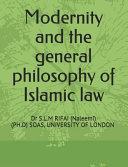Islamic Law
The general philosophy of Islamic law: This book primarily addresses three salient questions. What is the general philosophy of Islamic law: Maqāsid al-Shari'ah? Why do we need the doctrines of the general philosophy of Islamic law today? How do we apply the doctrines of the general philosophy of Islamic law in this modern world? The basic argument of this book is that dramatic social changes are taking place around us in this digital world. So, to relate Islamic teaching into this modern global world, we need not only a comprehensive reading of the divine text, but also, a comprehensive understanding of the contexts of this modern world. We could no longer adhere to the literal interpretation of divine texts in this modern world on certain aspects of Islamic teaching. Neither classical Islamic thought nor the literal legal schools provide ready-made answers for the problems of modern Islamic world. This does not mean we must abandon the divine text as some radical Muslim secularists claim. This does not mean we should ignore 1400 years of intellectual legacies in Islamic history. There is nothing wrong with the divine texts of the Qur'an and the prophetic traditions. Nevertheless, human understanding to the divine texts differ from century to century, place to place and person to person. For the last 14 centuries, different Muslim communities have been reading the corpus of Islamic law differently within their own social contexts. There is no uniformity in human understanding of divine texts. They are prone to different human interpretation for various reasons. The corpus of Islamic law we have today are the collections of the 1400 hundred years of the Islamic legal interpretation of different times and social contexts. Today, to choose some appropriate legal ideas from the 1400 hundred years of Islamic legacy we should have not only a thorough knowledge of Islamic sciences, but we should also contextual understanding of the divine texts. We should know how to relate the divine texts appropriately to the modern social conditions. The principles of the general philosophy of Islamic law are contrived to facilitate the application of the divine texts into different contexts without diluting the primary values of the divine texts. It is argued by many Muslim scholars that the Muslim communities are suffering from intellectual and ideological crises presently. This is reflected in the socio-political and religious thought of the contemporary Muslim communities Today; Islamic universities and colleges are producing thousands Muslim graduates in many Muslim countries. Most of these graduates are trained and educated in Islamic sciences alone without enough professional training and learning in modern sciences. As a result of this, many of them find it difficult to relate what they learn to the modern social issues. It is my firm contention in this book that the Muslim jurists must learn many modern sciences such as politics, geopolitics, economics, phycology, sociology, history, science, and many other areas of human sciences so that they could address the modern social issues that the Muslim community faces today. Otherwise, they would not be able to relate what they learn in Arabic college into modern social conditions. Therefore, I would argue that learning modern sciences is a prerequisite for the students of Islam to become jurists or scholar in Islam. It is also my conviction that many radical Muslim groups do not know how to relate many aspects of Islamic teachings into modern geopolitical and social conditions. They come into some erroneous conclusions in many religious issues. Because, they take the literal meanings of the divine texts and prophetic traditions without due consideration into the modern social conditions of this global world.
The general philosophy of Islamic law: This book primarily addresses three salient questions.









